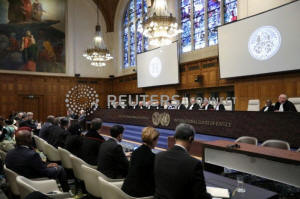World Court orders Myanmar to protect Rohingya from acts of genocide
 Send a link to a friend
Send a link to a friend
 [January 23, 2020]
By Stephanie van den Berg and Bart H. Meijer [January 23, 2020]
By Stephanie van den Berg and Bart H. Meijer
THE HAGUE (Reuters) - The International
Court of Justice on Thursday ordered Myanmar to take urgent measures to
protect its Rohingya population from atrocities, a ruling hailed as a
"triumph of international justice" by the tiny African country that
brought the case.
A lawsuit, launched by Gambia in November at the United Nations' highest
body for disputes between states, accuses Myanmar of genocide against
Rohingya in violation of a 1948 convention.
The court's final decision could take years, and Thursday's ruling dealt
only with Gambia's request for preliminary measures. But in a unanimous
ruling by the 17 judge panel, the court said the Rohingya face an
ongoing threat and Myanmar must act to protect them.
Myanmar must "take all measures within its power to prevent all acts"
prohibited under the 1948 Genocide Convention, and report back within
four months, presiding Judge Abdulqawi Yusuf said, reading out a summary
of the judgment.

Myanmar must use its influence over its military and other armed groups
to prevent violence against the Rohingya "intended to bring about its
physical destruction in whole or in part", he said.
Gambia's justice minister, Abubacarr Tambadou, said: "The fact that
judges have unanimously decided that genocide cannot be tolerated and
that Rohingya need to be protected is a triumph for international
justice."
Mainly Muslim Gambia brought the case despite being located halfway
around the world, on the argument that all nations have a universal
legal duty to prevent genocide. The case was argued last month by some
of the world's top human rights lawyers, with Myanmar's civilian leader
Aung San Suu Kyi personally attending hearings at The Hague to ask
judges to dismiss it.
More than 730,000 Rohingya fled Myanmar after a military-led crackdown
in 2017, and were forced into squalid camps across the border in
Bangladesh. U.N. investigators concluded that the military campaign had
been executed with "genocidal intent".
Moments before the court began reading its ruling, the Financial Times
published an article by Suu Kyi, in which she said war crimes may have
been committed against Rohingya Muslims but refugees had exaggerated
abuses.
[to top of second column]
|

General view of the court during the ruling in a case filed by
Gambia against Myanmar alleging genocide against the minority Muslim
Rohingya population, at the International Court of Justice (ICJ) in
The Hague, Netherlands January 23, 2020. REUTERS/Eva Plevier

INSUFFICIENT MEASURES
Although ICJ rulings are final and binding, countries have
occasionally flouted them, and the court has no formal mechanism to
enforce them.
“The ICJ order to Myanmar to take concrete steps to prevent the
genocide of the Rohingya is a landmark step to stop further
atrocities against one of the world’s most persecuted people,” said
Param-Preet Singh, associate international justice director at Human
Rights Watch.
“Concerned governments and UN bodies should now weigh in to ensure
that the order is enforced as the genocide case moves forward.”
Yusuf, the presiding judge, said the court was not satisfied with
Myanmar's own efforts "to facilitate the return of Rohingya refugees
present in Bangladesh, to promote ethnic reconciliation, peace and
stability in Rakhine State, and to make its military accountable for
violations of international humanitarian and human rights law".
More than 100 Myanmar civil society groups published a statement
saying they hoped international justice efforts would "bring forth
the truth" and end impunity.
"Political and military policies have always been imposed with
violent force and intimidation upon the people of Myanmar,
systematically and institutionally, on the basis of their political
and religious beliefs and ethnic identities and continue until the
present," the statement said.

(Reporting by Stephanie van den Berg; Additional reporting by Ruma
Paul in Cox's Bazar and Poppy McPherson in Yangon; Writing by Kevin
Liffey; Editing by Peter Graff)
[© 2020 Thomson Reuters. All rights
reserved.] Copyright 2020 Reuters. All rights reserved. This material may not be published,
broadcast, rewritten or redistributed.
Thompson Reuters is solely responsible for this content. |